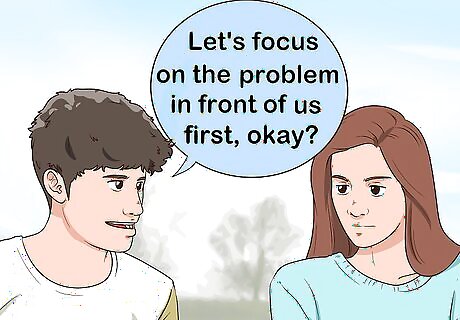
views
Diffusing Anger

Relax. Getting in an argument can shoot up temper and tension levels faster than you can say “mad.” Anger, however, only hinders your ability to resolve the situation. Breathe deeply from your stomach, in through your nose and out through your mouth, a few times. Shut your eyes as you practice deep breathing, imagining each inhale filling you with calm and melting away the tension in your body.

Lower your voice. Raised voices can make each of you feel attacked. Plus, shouting limits your ability to hear (or think) sensibly. The moment you notice yourself or the other person shouting, lower your voice to a softer, indoor level. Regulating your own voice can even unconsciously prompt the other person to do the same.

Use humor. Sometimes, the best way to reduce tension is by being light-hearted. Not everything--even arguments--has to be taken so seriously. Toss in a quip to lessen the anger. You might say, “Gee, is that actual smoke coming from your ears?” Or try talking in Pig Latin, “Iway eelfay upidstay.”

Say the magic word. If you and your partner or best friend, for instance, catch yourselves arguing about something silly or minor, one of you can simply call out a magic word. This magic word should be something to remind you to calm down and not take yourselves so seriously. For example, one of you might shout “Unicorn!” or “Banana!” to diffuse tension.

Agree. The disagreeing part of disagreements is typically what has everyone up in arms, but it doesn't have to be that way. Besides, it's unlikely that you disagree with everything they’re saying. Shift the tides and reduce the tension by agreeing. A well-timed “Good point” or “I agree with you on that” can help you move towards a resolution. If you're having a bad day and you're not sure where you stand on the issue, try saying something like "I'm not having the best day, can we start this conversation over?"
Getting Some Perspective

Take a break. It's really hard to be sensible in the heat of the moment. If you're having trouble calming down, ask for a short break. Go outside for a walk or watch a funny YouTube video to help you relax. You might even say “I need a bathroom break.” Then, go splash some water in your face or glare angrily into the mirror until you've calmed down a bit.

Write it down. Going back over your premise in a different format (on paper) can help you see the cracks in your reasoning, or even help you spot the common ground between you and the other person. Challenge yourself to write out your point-of-view. You might suggest, “It doesn't seem like we're getting anywhere like this. Why don't we both write down our main points and then share them aloud once we're finished?”

Imagine you're helping a friend. Get some clarity about the argument by pretending it's happening to a friend. This method can help you take a step back and remove some of your own emotional attachment from the situation. If your best friend were having the same argument, how would you recommend they end it? Devise a course of action as if it were for a friend. Then, follow your own advice.
Resolving the Problem

Stick to the issue at hand. Bringing up old problems or other similar situations muddies the water and makes it even harder to safely wade out. Make an effort to only discuss the current problem. If one of you brings up something from the past, the other can say something like, “Let's focus on the problem in front of us first, okay?”

Set a timer. After reducing tension and getting perspective, the final knockout punch for ending an argument is finding a solution. To be sure that happens quickly and without rehashing the whole issue, set a timer. Set the timer for 20 or 30 minutes and aim to resolve things by then.

Get real about your feelings using “I” statements. Anger can cloud your ability to see the real issue at hand. Often, there are other feelings lurking beneath that anger. Try to name and own what you're really feeling with “I” statements. For example, anger might provoke you to say harsh things, like “You're so insensitive. You don't care about how your actions affect me.” Reframe that with an “I” statement like, “I feel ignored. I would appreciate it if you considered how the things you do affect me.”

Be flexible. All arguments can't end with each person getting their way. Both parties have to be willing to make some concessions for the greater good. This requires flexibility. Ask yourself whether the issue is really all that important to you. Will it matter in 5 years? If not, you might agree to disagree or concede if the issue is actually important to the other person. For example, if you and your coworker are disagreeing over who will lead a presentation, question whether you really care. If not, let them lead or agree that they will do it this time and you will lead next time.
Handling Recurring Arguments

Be okay with "losing." A common problem for people who have recurring arguments is that one or both people are mainly concerned with winning the argument. Focusing on winning means that you're more likely to hit below the belt or break the typical rules of communication to get your point across. Shift your perspective and be fine with losing the argument. If you "lose" the argument, it means that you haven't jeopardized your ethics for the sake of winning. "Losing" puts you in a position to learn or grow from the situation. "Losing" also means taking the high road. Even if your partner fights dirty, you shouldn't.

Recognize and deal with guilt correctly. Many times when you get into an argument with someone, it escalates because you start to feel guilty. This guilt pops up because you believe you did something wrong or you think you didn't measure up in some way. Once you feel guilty, you try to relieve your guilt by making it about the other person: how they are flawed or what they have done wrong. When an argument occurs, immediately pay attention to how you feel and cope with that feeling in a way that doesn't involve hurting your partner in turn. For example, you might softly caress your own shoulder as a way to show compassion for yourself or silently remind yourself "I am only human." Changing the way you react to those feelings of guilt will lower the chances of you lashing out and turning a small disagreement into a major fallout.

Visit a counselor. If you and another person regularly get into arguments, you may need a professional to help you build healthier conflict resolution skills. Have the courage to admit you need help and ask your loved one to go to counseling with you. You might say, "Sweetheart, I feel like we argue about the same things over and over. I really want us to have more positive interactions. What do you think about going to counseling?"




















Comments
0 comment